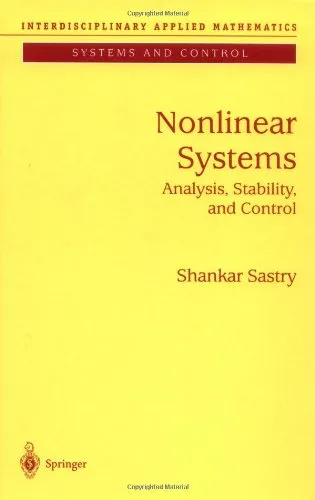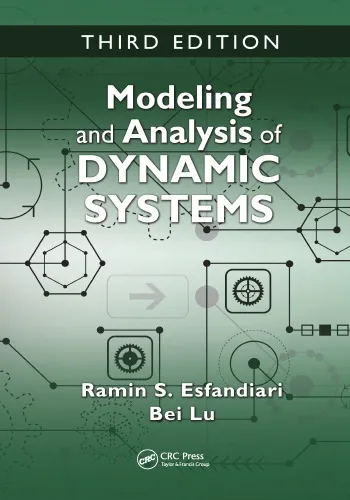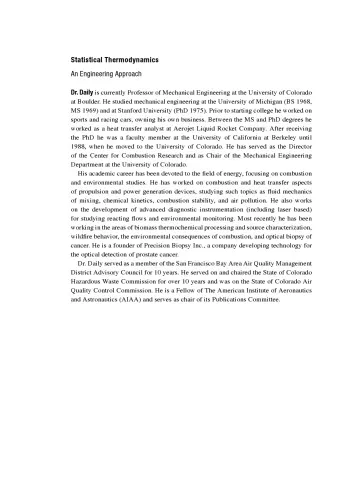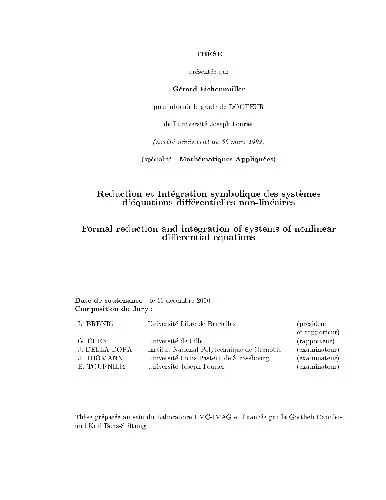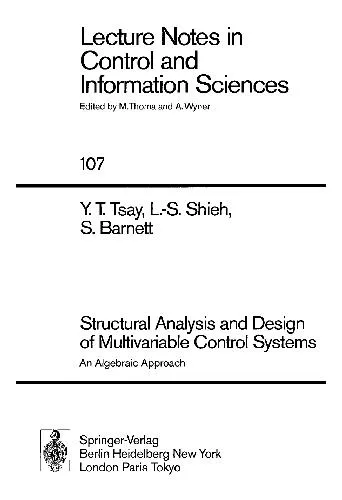Nonlinear Systems: Analysis, Stability, and Control
4.5
بر اساس نظر کاربران

شما میتونید سوالاتتون در باره کتاب رو از هوش مصنوعیش بعد از ورود بپرسید
هر دانلود یا پرسش از هوش مصنوعی 2 امتیاز لازم دارد، برای بدست آوردن امتیاز رایگان، به صفحه ی راهنمای امتیازات سر بزنید و یک سری کار ارزشمند انجام بدینکتاب های مرتبط:
معرفی کتاب Nonlinear Systems: Analysis, Stability, and Control
کتاب Nonlinear Systems: Analysis, Stability, and Control اثری معتبر و جامع در حوزه سیستمهای غیرخطی است که توسط نویسنده معروف شکر سستری (Shankar Sastry) نوشته شده است. این کتاب منبعی اصولی و پیشرفته برای دانشجویان، اساتید و محققان در حوزه سیستمهای دینامیکی، کنترل غیرخطی و پایداری سیستمها محسوب میشود. محتوای این کتاب به طرز دقیقی مفاهیم پایه را همراه با نظریههای پیشرفته و کاربردهای عملی در این حوزه ارائه داده و منجر به درکی عمیق از سیستمهای غیرخطی میشود.
خلاصه کتاب
کتاب Nonlinear Systems: Analysis, Stability, and Control به شکلی سیستماتیک به مطالعه و تجزیه و تحلیل سیستمهای غیرخطی میپردازد. ابتدا مفاهیم بنیادی مانند انواع پایداری، Linearization و رفتار سیستمهای غیرخطی شرح داده شدهاند. سپس نویسنده به بررسی روشهای تحلیلی پیشرفته مانند Lyapunov methods، Input-to-State Stability (ISS) و مرکزمانایی Center Manifold Theory میپردازد. در فصول بعدی، بحث به سمت طراحی قوانین کنترلی برای سیستمهای پیچیده نظیر Adaptive Control و Feedback Linearization هدایت میشود. این کتاب نه تنها شامل تحلیل دقیق ریاضی است، بلکه با ارائه مثالهای کاربردی و عملی، ارتباط بین نظریه و عمل را به خوبی برقرار میکند.
نکات کلیدی
- معرفی روشهای جامع برای بررسی پایداری سیستمهای غیرخطی.
- آموزش مفاهیم پیچیدهای همچون Input-to-State Stability (ISS) و Lyapunov Functions به زبانی ساده.
- بررسی روشهای پیشرفته طراحی کنترل همچون Robust Control و Adaptive Control.
- اتصال نظریههای ریاضی با مسائل واقعی در سیستمهای دینامیکی.
- ارائه مثالهای کاربردی برای درک بهتر مباحث پیچیده.
نقل قولهای معروف از کتاب
"Understanding nonlinear dynamics is the key to unlocking the complexities of real-world systems."
"The beauty of nonlinear systems lies in their richness of behavior and inherent unpredictability."
چرا این کتاب اهمیت دارد؟
کتاب Nonlinear Systems: Analysis, Stability, and Control به عنوان یک مرجع استاندارد شناخته میشود که نیازهای آموزشی و تحقیقاتی متخصصان در حوزه کنترل و سیستمهای غیرخطی را پوشش میدهد. این کتاب به دلیل جامعیت مطالب، به روز بودن اطلاعات و سبک آموزشی مثالمحور خود، جایگاه برجستهای در بین منابع آموزشی کسب کرده است. همچنین، با ارائه روشهای عملی برای تحلیل و طراحی سیستمهای کنترلی، این کتاب به محققان و مهندسین کمک میکند تا مشکلات پیچیده دنیای واقعی را به صورت مؤثرتری حل کنند. اگر در حال مطالعه در حوزه کنترل غیرخطی هستید یا میخواهید درک عمیقی از سیستمهای دینامیکی به دست آورید، این کتاب ابزار ضروری برای تحقق اهداف شما خواهد بود.
Introduction to "Nonlinear Systems: Analysis, Stability, and Control"
"Nonlinear Systems: Analysis, Stability, and Control" is a comprehensive exploration of one of the most challenging and fascinating fields of study in engineering and applied mathematics: nonlinear systems. Authored by Shankar Sastry, this book delves deep into the theoretical and practical aspects of nonlinear systems, making it an invaluable resource for students, researchers, and practitioners alike. With its rigorous mathematical foundation and practical insights, this book bridges the gap between theory and implementation in the study of nonlinear dynamics.
Over the decades, nonlinear systems analysis has emerged as a cornerstone in understanding real-world dynamical systems, spanning disciplines such as robotics, control theory, economics, and even biological systems. While linear systems offer foundational clarity, they fail to capture the complexities of nonlinear systems, which are ubiquitous in practice. This book provides readers with an extensive framework for analyzing nonlinear stability, control, and systems dynamics, ensuring they understand key engineering methodologies and advanced mathematical theories.
Detailed Summary of the Book
The book is structured to facilitate learning, progressively moving from fundamental topics to advanced concepts. It begins with an introduction to nonlinear systems and motivation for their study, covering real-world examples that underscore the importance of understanding nonlinear behaviors. The mathematical foundations necessary for analyzing nonlinear systems, including phase portraits, stability definitions, and bifurcations, are thoroughly developed.
One of the key elements of the text is its emphasis on Lyapunov stability theory, providing a rigorous perspective on determining the stability properties of nonlinear systems. The book further explores topics such as input-output stability, passivity theory, bifurcation theory, and chaos. Advanced topics like the theory of differential geometry and nonlinear control also receive significant coverage, offering readers a complete view of nonlinear systems.
Practical application is a major strength of this book, as it doesn’t simply dwell on theoretical aspects. It provides tools and techniques that can be directly used to analyze and design systems in real-world applications. Topics such as control synthesis, input-output linearization, and optimal control are addressed in detail, making this book highly relevant to engineers and practitioners.
Key Takeaways
- Gain a deep understanding of the key mathematical tools needed to study nonlinear dynamics, including phase plane analysis and Lyapunov methods.
- Explore stability, bifurcation, and chaos concepts, both theoretically and through practical applications.
- Learn how to design control strategies using advanced tools such as input-output linearization and geometric control theory.
- Understand the critical differences between linear and nonlinear systems and the unique challenges posed by nonlinearities.
- Access a wide-ranging compilation of theoretical developments that are directly applicable to real-world engineering scenarios.
Famous Quotes from the Book
"In engineering and science, the world is inherently nonlinear. To ignore nonlinearity is to ignore the complexity and richness of real-world systems."
"Lyapunov stability theory forms the heart of nonlinear systems analysis, offering a systematic way to assess the robustness and behavior of complex dynamical systems."
Why This Book Matters
Nonlinear systems govern numerous phenomena in the physical, biological, and engineering sciences. The ability to analyze and control these systems is critical for advancement in technology, from robotics and automated systems to biological networks and economic stability. This book is a cornerstone in this field due to its mathematical rigor, comprehensive coverage, and practical insights. Shankar Sastry has masterfully created a resource that balances theoretical depth with real-world applicability, ensuring that readers are equipped with the tools to understand and manipulate nonlinear systems with confidence.
Furthermore, the book serves as an indispensable reference for those entering academic research in control theory or seeking to apply nonlinear analysis in modern industries. Its rich set of examples and exercises ensures that readers not only comprehend the material but also gain hands-on experience in applying it to real-world problems.
The interdisciplinary nature of this book makes it appealing to engineers, mathematicians, computer scientists, and even physicists. For students, it provides a foundational understanding of nonlinear behaviors that are often omitted in traditional curricula. For practitioners, it offers cutting-edge tools and techniques that are essential for modern design and control systems.
Ultimately, "Nonlinear Systems: Analysis, Stability, and Control" is a book that transcends boundaries, equipping readers with the skills and knowledge to tackle some of the most complex and fascinating challenges in science and engineering.
دانلود رایگان مستقیم
شما میتونید سوالاتتون در باره کتاب رو از هوش مصنوعیش بعد از ورود بپرسید
دسترسی به کتابها از طریق پلتفرمهای قانونی و کتابخانههای عمومی نه تنها از حقوق نویسندگان و ناشران حمایت میکند، بلکه به پایداری فرهنگ کتابخوانی نیز کمک میرساند. پیش از دانلود، لحظهای به بررسی این گزینهها فکر کنید.
این کتاب رو در پلتفرم های دیگه ببینید
WorldCat به شما کمک میکنه تا کتاب ها رو در کتابخانه های سراسر دنیا پیدا کنید
امتیازها، نظرات تخصصی و صحبت ها درباره کتاب را در Goodreads ببینید
کتابهای کمیاب یا دست دوم را در AbeBooks پیدا کنید و بخرید
1477
بازدید4.5
امتیاز0
نظر98%
رضایتنظرات:
4.5
بر اساس 0 نظر کاربران
Questions & Answers
Ask questions about this book or help others by answering
No questions yet. Be the first to ask!
